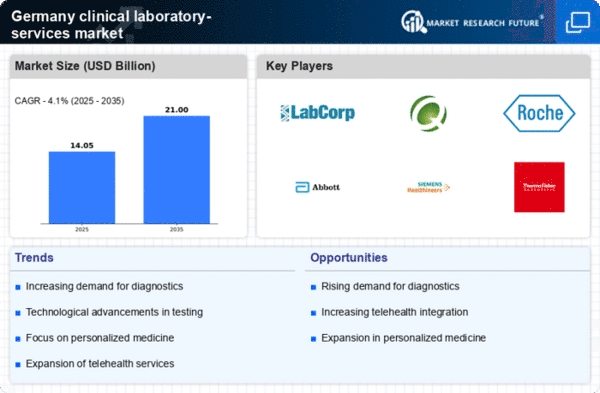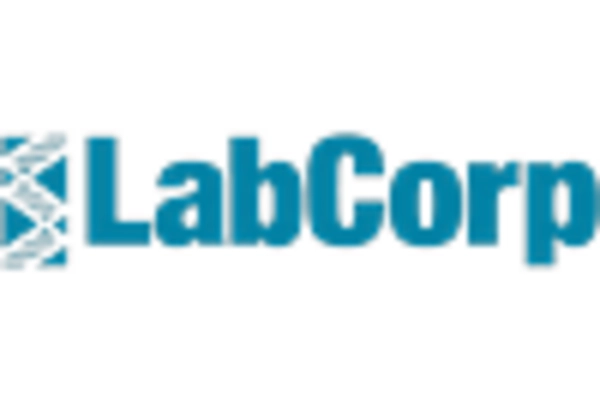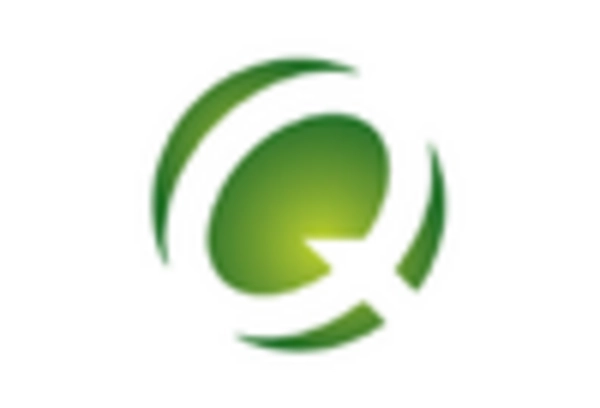Rising Prevalence of Chronic Diseases
The clinical laboratory-services market in Germany is experiencing growth due to the rising prevalence of chronic diseases. These include diabetes, cardiovascular disorders, and cancer. As the population ages, the demand for diagnostic testing increases, necessitating advanced laboratory services. According to recent data, chronic diseases account for approximately 70% of all deaths in Germany, highlighting the urgent need for effective diagnostic solutions. This trend drives investments in laboratory infrastructure and technology, enabling laboratories to provide timely and accurate results. Consequently, the clinical laboratory-services market is poised for expansion as healthcare providers seek to enhance patient outcomes through early detection and management of chronic conditions.
Increased Focus on Preventive Healthcare
There is a notable shift towards preventive healthcare in Germany, which significantly impacts the clinical laboratory-services market. As awareness of health issues grows, individuals are increasingly opting for routine screenings and diagnostic tests to identify potential health risks early. This proactive approach is supported by government initiatives promoting preventive measures, which aim to reduce healthcare costs in the long run. The market is projected to grow as more people engage in health monitoring, with laboratory services playing a crucial role in facilitating these preventive strategies. The emphasis on prevention is likely to drive innovation and expansion within the clinical laboratory-services market.
Growing Investment in Research and Development
Investment in research and development (R&D) within the healthcare sector is a key driver for the clinical laboratory-services market in Germany. The government and private entities are allocating substantial funds to develop innovative diagnostic tools and techniques. This focus on R&D is essential for addressing emerging health challenges and improving existing laboratory services. In 2025, R&D spending in the healthcare sector is projected to reach €10 billion, indicating a robust commitment to advancing laboratory capabilities. As new technologies and methodologies are developed, the clinical laboratory-services market is likely to expand, offering enhanced diagnostic solutions to healthcare providers.
Technological Integration in Laboratory Operations
Advanced technologies are transforming laboratory operations within the clinical laboratory-services market in Germany. Automation, artificial intelligence, and data analytics are enhancing the efficiency and accuracy of laboratory processes. For instance, the adoption of robotic systems for sample handling and testing is reducing turnaround times and minimizing human error. Furthermore, the implementation of electronic health records (EHR) facilitates seamless data sharing among healthcare providers, improving patient care. As laboratories increasingly adopt these technologies, the clinical laboratory-services market is expected to witness significant growth, driven by the demand for high-quality, reliable diagnostic services.
Regulatory Framework Supporting Laboratory Standards
The regulatory framework in Germany plays a pivotal role in shaping the clinical laboratory-services market. Stringent regulations ensure that laboratories adhere to high standards of quality and safety, fostering public trust in diagnostic services. The Federal Institute for Drugs and Medical Devices (BfArM) oversees the compliance of laboratory practices, which encourages laboratories to invest in quality management systems. This regulatory support not only enhances the reliability of laboratory results but also stimulates market growth by attracting investments. As laboratories strive to meet regulatory requirements, the clinical laboratory-services market is expected to flourish, driven by a commitment to excellence in diagnostic services.

















